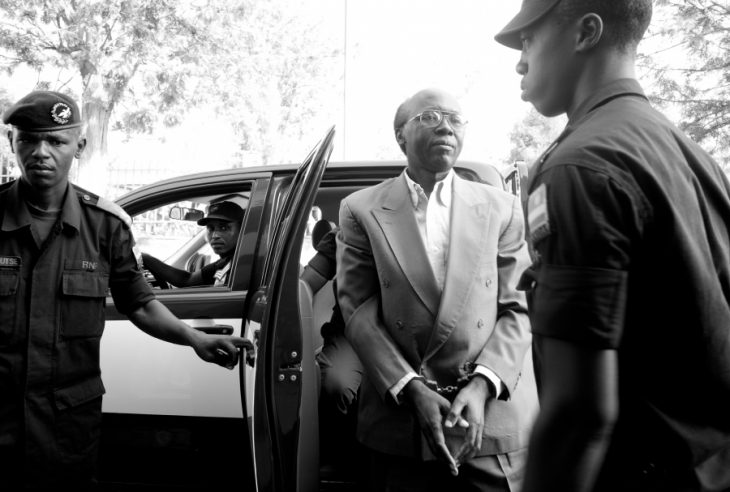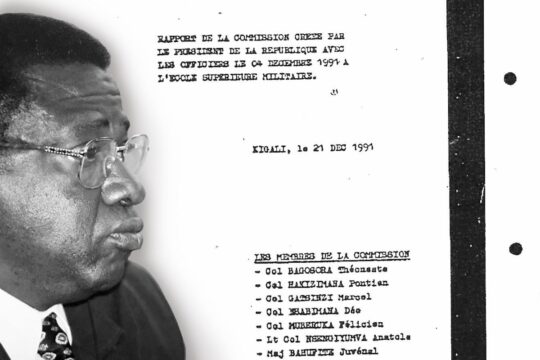A Rwandan court on Friday sentenced former politician Leon Mugesera to life in prison for inciting the 1994 genocide.
Judge Antoine Muhima said Mugesera had taken part in "public incitement to commit genocide" as well as inciting torture and ethnic hatred, though he was found not guilty of planning and conspiracy to commit genocide.
Mugesera, 63, the former head of the party of assassinated President Juvenal Habyarimana, denied all charges and appealed the verdict. He said he was in Canada when the killings began in Rwanda in 1994.
The prosecution said that Mugesera, a linguist, called Tutsis "cockroaches" and "scum", and encouraged his fellow Hutus to kill them in a 1992 speech.
Lawyers argued the speech helped trigger the Rwandan genocide two years later in which an estimated 800,000 people, mainly Tutsis, died.
Mugesera, however, challenged the authenticity of the recording of the speech.
Canada deported him in January 2012 after 15 years of court battles. His trial opened in Kigali in January 2013.At the time of this speech Mugesera, now 63, was teaching at the National University of Rwanda (UNR) and was deputy president for the northern Gisenyi region of the MRND, the party of former Rwandan President Juvénal Habyarimana. The Prosecutor alleges that this controversial speech was a clear incitement to Hutus, especially those in Gisenyi, to commit the genocide of Tutsis that took place two years later.
A question of context?
Mugesera has always claimed that these words, pronounced in a climate of opening to multiparty democracy but also armed conflict between the Rwandan government and RPF rebels (now in power), have been taken out of context.The day after the speech, the Rwandan government at the time led by a Prime Minister from the opposition, accused by Mugesera and others of “complicity with the RPF”, issued an arrest warrant for him. Mugesera fled the country, finally settling in Canada.As of 1995, Mugesera was wanted by the Rwandan authorities. He embarked on a long episode of legal battles in Canada, but finally could not escape extradition in January 2012.In his first appearance before a Rwandan judge on February 2, 2012, he asked for his trial to be held in French, saying that he no longer mastered his native language Kinyarwanda. Trying to explain, he said there were “judicial and scientific terms” in Kinyarwanda that he did not know. His request was thrown out, but he appealed. Rwandan judicial authorities decided to hold the trial in Kinyarwanda. The Accused nevertheless expressed himself during the hearings in a mixture of Kinyarwanda and French. Rwandan Attorney General at the time Martin Ngoga said Mugesera’s attempt to avoid a trial in Kinyarwanda was a strategic choice. “There are expressions and insinuations in that speech that get lost in translation,” he told Hirondelle News Agency. “The speech should not be taken out of its context and its language.”Witnesses brought by the prosecution, including some close to Mugesera, told the court that Tutsis in the region were targeted after the speech.
Defence complaints
The trial took place amidst almost constant antagonism between the Chamber and Mugesera’s lawyer who accused the Defence Ministry of refusing to pay the fees and expenses needed to prepare his defence. In effect, the Accused did not bring any defence witnesses, whereas the judges accorded him several postponements in order to do so. The prosecutor has always maintained that such requests were just a ploy and that Mugesera did not prove he was indigent, i.e. unable to pay his defence costs himself.On July 23, 2015, the prosecution requested a life sentence for Mugesera, the maximum sentence in Rwanda, which scrapped the death penalty in 2007. The defence was then given additional time to supplement its case, but when the trial closed on October 14 last year, Mugesera was alone against his judges. The judges asked him to sum up, but he said he could not plead his cause alone at this crucial moment without his lawyer.





